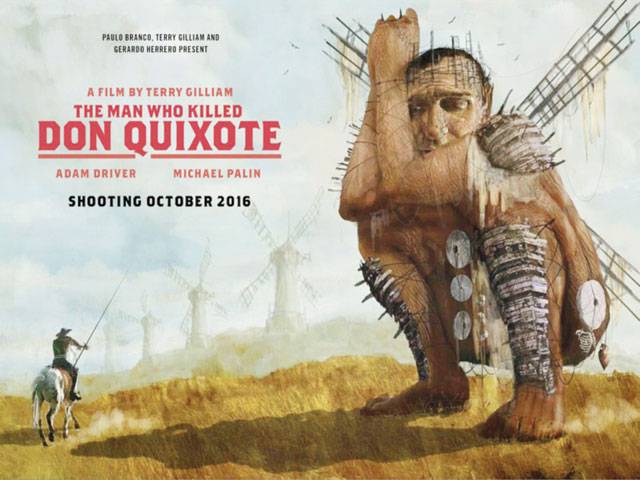CANNES - A legal bid to stop the world premiere of Terry Gilliam’s disaster-plagued film “The Man Who Killed Don Quixote” at Cannes has failed - but the war over its rights is far from over. The film’s former producer Paulo Branco had attempted to stop the movie closing the world’s top film festival next weekend.
But Cannes’ lawyers and Gilliam’s producers told AFP that “we have won”, though Branco said Thursday that judges in Paris had declared the screening technically illegal and ordered that his rights to the film be shown in the credits.
The Monty Python veteran released a picture of himself in a “Quixote Vive” T-shirt in his garden to celebrate the victory, declaring: “Not dead yet! We are coming to Cannes.”
Gilliam has struggled for nearly two decades to get the film, one of the most ill-fated in movie history, to the screen.
The legendary polymath and maker of such screen classics as “Time Bandits” and “Brazil” reportedly suffered a minor stroke at his London home at the weekend but was later released from hospital. “After days of rest and prayers to the gods I am restored and well again. So is ‘The Man Who Killed Don Quixote’!” he tweeted Wednesday after the verdict.
“We are legally victorious! We will go to the ball, dressed as the closing film at Festival de Cannes! May 19. Thanks for all your support.”
Cannes director Thierry Fremaux - who infuriated Branco last week by weighing in to support Gilliam - confirmed the “triumph” before a gala screening at the festival to cheers from the audience, which included Hollywood stars Cate Blanchett and Kristen Stewart. He said that the 77-year-old Gilliam would be well enough to travel to Cannes for the premiere. “Terry Gilliam will be there. Let’s turn this victory into a great party,” the festival later tweeted.
Gilliam’s various attempts to shoot the surreal story based on Cervantes’ “unfilmable” novel have been beset by a series of calamities, some of them recounted in the acclaimed 2002 documentary, “Lost in La Mancha”.
The set was washed away during an aborted attempt to make it in 2000 with Johnny Depp, when lead actor Jean Rochefort also had to be airlifted to hospital after falling ill.
A host of Hollywood stars including Ewan McGregor, John Hurt, Robert Duvall and Jack O’Connell were later linked with the project, but each time the production fell through.
Minutes before news of Wednesday’s verdict leaked out, Branco - who said the judges confirmed that he owns the rights to the film - warned that the battle still very much on.
The Paris judges are due to rule next month on a wider case over who owns the rights.
Courts in France and Britain have previously sided with Branco in the long-running dispute.
He was the producer of a 2016 attempt to make the film which fell through when he failed to raise the budget.
The Portuguese-born producer last week tried to obtain a court order stopping the film, which features “Star Wars” actor Adam Driver and Jonathan Pryce, from being shown at Cannes and released in France.
Gilliam had earlier told AFP that Branco had “nothing to do with the (final) film.
“There is no negotiating with him - his demands are laughable, absurd. He is trying to make as much money as he possibly can from a film he did not produce,” he added.
But Branco told reporters Wednesday that he had sunk 800,000 euros ($948,000) of his own money into the project. “It is thanks to us that this film was made,” he said.
And he warned that he would pursue Fremaux and the festival for damages in the courts.
His lawyer son, Juan Branco, said the details of the verdict showed his father would be the real winner in the long run, and he accused Fremaux of “launching a shameful press campaign against him.”
He also pointed to as yet unconfirmed reports in the US trade press that streaming giant Amazon has pulled out of distributing the film in the United States.
French Culture Minister Francoise Nyssen had earlier told reporters that she hoped the film would be screened. “It is not great to hold an artist hostage,” she said.






